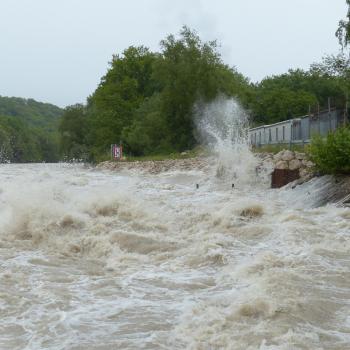Go to your cell, and your cell will teach you everything. ~ Moses of Scetis
My friend the Rev. Ken Malcolm and I are teaching a Lenten series on ancient Christian spiritualities this Lent, and last Sunday we discussed the spirituality of the Desert Fathers and Mothers. They aren't as well-known as they should be. Ken talked about how he had not met these spiritual adventurers until his first graduate class; I had not run across them until around age 40 when I was doing spiritual triage to keep myself alive and they were spirit-fed into my hands. But despite their age—1500 years and counting!—the Desert Mothers and Fathers are still giving us vital wisdom to live by.
The Fathers and Mothers are sometimes marginalized today as freaks, hermits, or ascetic athletes, but the truth is that their quest was a counter-cultural Christian journey that, to some degree, all of us should be on: fleeing from the distractions of a secular culture, making silence so we can begin to hear the voice of God, spiritual practice (prayer and fasting for the Mothers and Fathers), honest self-assessment to discover our faults, forgiveness for the faults of others, and—oh, strange paradox from these freaks and hermits—faithful life in community.
Saint Antony the Great (sometimes called the Father of All Monks) is credited with initiating this run for the desert. Antony said, "He who sits alone and is quiet has escaped from three wars: hearing, speaking, seeing: but there is one thing against which he must constantly fight: that is, his own heart." By fleeing the distractions of the world, one may more easily find all of these things, although they will never be easily found. Practice is work.
Another well-known Father (Abba) was Arsenius, born to a senatorial family in Rome, who served as imperial tutor, living in lavish surroundings but feeling the tug of the Spirit to something else. While in the palace, he prayed, "Lord, show me the way of salvation," and a voice came to him saying, "Arsenius, flee from men and you will be saved." As he prepared to leave for the desert, he prayed again, asking how to be saved, and a voice said to him, "Arsenius, flee, be silent, pray always, for these are the roots of sinlessness."
Fleeing was not simply about geographical relocation, but more truly, about spiritual reorientation. We all know people who are always on the run, always seeking themselves in a new locale or situation, and never finding themselves. Mother (Amma) Syncletica said, "We carry ourselves wherever we go and we cannot escape temptation by mere flight." Fleeing is also about fleeing from the temptations and disordered desires we bring with us.
The prescription given to Arsenius and Antony was consistent in the stories of the Mothers and Fathers: flee, be silent, pray.
So silence was an essential part of this spiritual work, and one we desperately need to recover today. Many of us have no moments in the day which are not filled with some sort of white noise—music, TV, car radio, conversation, hard work. One of my favorite stories from the tradition reinforces this need. An Abba in the desert was asked for a word of wisdom.
"Flee," he advised.
The potential advisee looked around the barren landscape. This was the end of the world. "Where may I flee from here?" he asked.
"Flee this," the Abba said, putting a finger to his lips, and retiring back into his cell.
Many of the stories of the Fathers and Mothers are about silence, about making space for God to speak, and about how in the silence we can begin to pay attention, one of the central tenets of any spiritual practice. So a worthwhile question for us might be: How can we make space for silence in our busy days so we can learn, be acted upon by the Spirit, be transformed?
Alongside their practice of silence, the monks and mothers sat in their cells or outside doing simple labor to support themselves, and praying continuously. They lived as simply as they could, fasting and abstaining from food so as to avoid distraction and the sins of desire and gluttony. This is still a worthwhile practice: my friend Chris Seay is in the middle of a beans and rice "fast" for Lent, undergone to be in solidarity with the world's poor—and, he said, to remove his constant internal monologue about where and what he was going to eat next.
In the process of listening, praying, and denying themselves, the Fathers and Mothers were forced to wrestle with the demons of their disordered desires: lust, gluttony, acquisitiveness. In the stories, these desires are typically presented as actual demons. I've never had in-the-flesh demons to reckon with, but mine—and yours, I'm guessing—are plenty real, all the same.
One of the most important understandings from the Desert tradition is that the Mothers and Fathers tried to be honest about themselves and their struggles—honest to themselves, and often to members of the "community," so that they could both be held accountable and be given spiritual aid. Story after story speaks of these holy men and women struggling with the very same things you and I struggle with in modern permutations.





